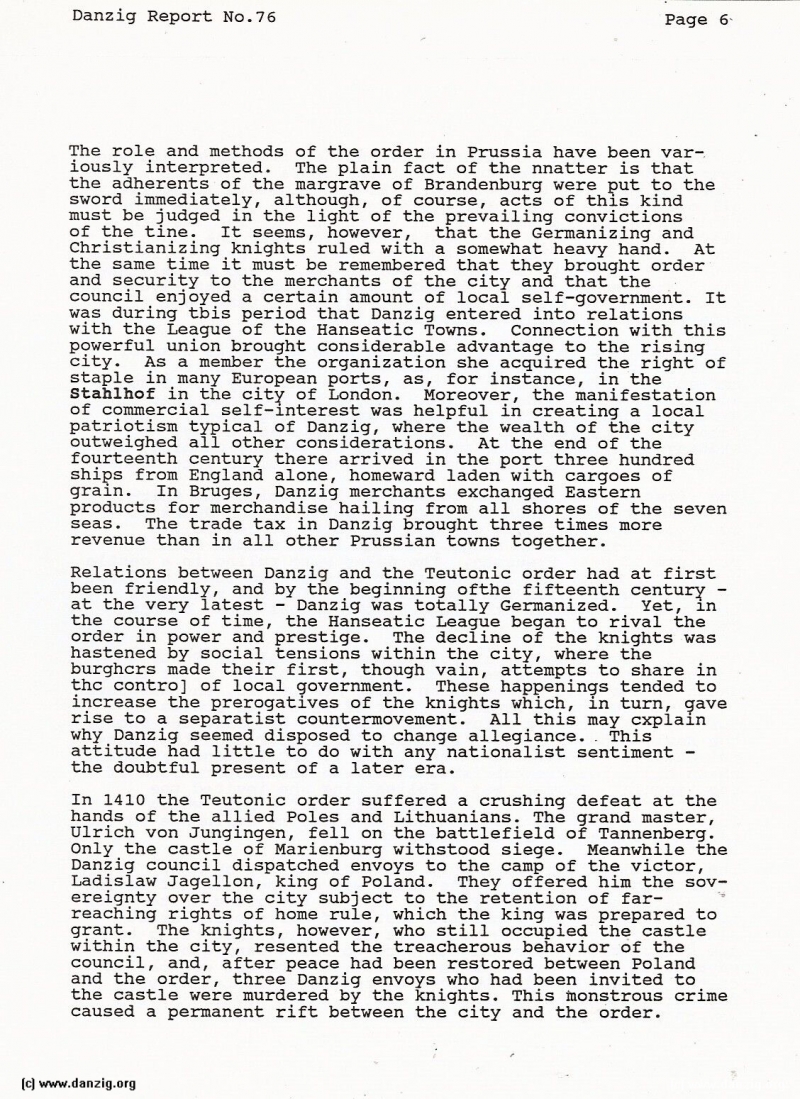
The role and methods of the order in Prussia have been vari ously interpreted. The plain fact of the nnatter is that the adherents of the margrave of Brandenburg were ut to the sword immediately, although, of course, acts of this kind must be judged in the light of the prevailing convictions of the tine. It seems, however, that the Germanizing and Christianizing knights ruled with a somewhat heavy hand. At the same time it must be remembered that they brought order and security to the merchants of the city and that the council enjoyed a certain amount of local self—government. It was during tbis period that Danzig entered into relations with the League of the Hanseatic Towns. Connection with this powerful union brought considerable advantage to the rising city. As a member the organization she acquired the right of staple in many European ports, as, for instance, in the Stahihof in the city of London. Moreover, the manifestation of commercial self—interest was helpful in creating a local patriotism typical of Danzig, where the wealth of the city outweighed all other considerations. At the end of the fourteenth century there arrived in the port three hundred shies from England alone, homeward laden with cargoes of grain. In Bruges, Danzig merchants exchanged Eastern products for merchandise hailing from all shores of the seven seas. The trade tax in Danzig brought three times more revenue than in all other Prussian towns together.
Relations between Danzig and the Teutonic order had at first been friendly, and by the beginning ofthe fifteenth century - at the very latest — Danzig was totally Germanized. Yet, in the course of time, the Hanseatic League began to rival the order in power and prestige. The decline of the knights was hastened by social tensions within the city, where the burghcrs made their first, though vain, attempts to share in thc contro) of local government. These happenins tended to increase the prerogatives of the knights which, in turn, gave rise to a separatist countermovement. All this may cxplain why Danzig seemed disposed to change allegiance. This attitude had little to do with any nationalist sentiment — the doubtful present of a later era.
In 1410 the Teutonic order suffered a crushing defeat at the hands of the allied Poles and Lithuanians. The grand master, Ulrich von Jungingen, fell on the battlefield of Tannenberg. Only the castle of Marienburg withstood siege. Meanwhile the Danzig council dispatched envoys to the camp of the victor, Ladislaw Jagellon, king of Poland. They offered him the sove reignty over the city subject to the retention of far- reaching rights of home rule, which the king was prepared to grant. The knights, however, who still occupied the castle within the city, resented the treacherous behavior of the council, and, after peace had been restored between Poland and the order, three Danzig envoys who had been invited to the castle were murdered by the knights. This monstrous crime caused a permanent rift between the city and the order.
Danzig Report Vol. 1 - Nr. 76 - July - August - September - 1992, Page 6.
Hits: 3512
Added: 02/07/2015
Copyright: 2025 Danzig.org

